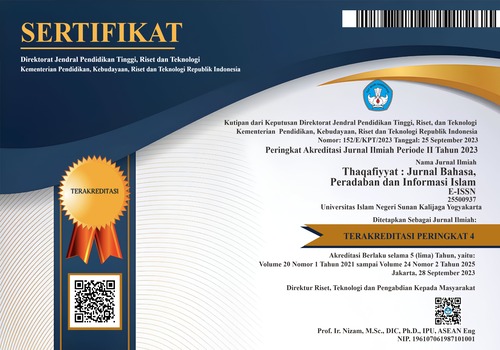PENGARUH HAJI TERHADAP POLITIK ISLAM DI INDONESIA (TAHUN 1900-1945)
DOI:
https://doi.org/10.14421/thaq.2015.%25xAbstrak
Hajj is one of the compulsory worship in Islam for every Muslim who
has an ability to carry it out. Pilgrimage has given a new color to the new
history of the struggle against colonialism in Indonesia, one of which is
indicated by the emergence of Islamic political organizations in the period 1900-1945 AD. Hajj activities affect the attitudes and political organization with the emergence of Islamic political organizations were represented by Syarikat Islam then turned into PSII and Permi (Indonesian Muslim Unity Party). This study examines by looking at changes in thinking that occur after the pilgrimage to the effects of the birth of political organization. Changes may include an understanding of the religion and the political ideology thought to unify the spirit of unity of Muslims in this country, to fight for freedom and the struggle against the colonialist.
Keywords: Hajj, political organizations, struggle
Unduhan
Referensi
Unduhan
Diterbitkan
Terbitan
Bagian
Lisensi
Authors who will publish with this journal agree to the following terms:
- Thaqafiyyat: Jurnal Bahasa, Peradaban dan Informasi Islam publishes all articles entirely in full text.
- It is permissible for readers to download and to use it for scientific purposes and scientific dissemination.
- Authors retain copyright and grant the journal right of first publication with the work simultaneously licensed under a Creative Commons Attribution License that allows others to share the work with an acknowledgement of the work's authorship and initial publication in this journal.
- Authors are able to enter into separate, additional contractual arrangements for the non-exclusive distribution of the journal's published version of the work (e.g., post it to an institutional repository or publish it in a book), with an acknowledgement of its initial publication in this journal.
- Authors are permitted and encouraged to post their work online (e.g., in institutional repositories or on their website) prior to and during the submission process, as it can lead to productive exchanges, as well as earlier and greater citation of published work.










